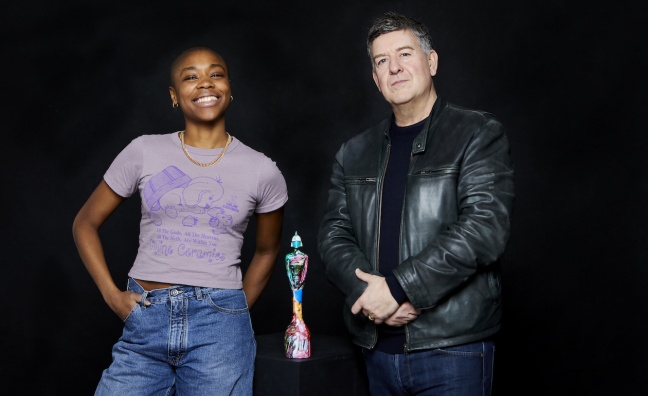The return of the BRIT Awards means all eyes are on the UK music industry once again, as the show celebrates the best of the past 12 months. With Dua Lipa, Raye, Central Cee, J Hus and many more starring among the nominees, and the legendary Kylie picking up the Global Icon Award, there are stories everywhere you look. Add in the changes following the fallout from last year’s absence of women from the Artist Of The Year shortlist and the introduction of a standalone R&B category, and there’s plenty for Damian Christian, returning for his second year as showrunner, to discuss. Here, alongside this year’s trophy designer Rachel Jones, Atlantic Records UK MD and president of promotions looks ahead to the big do and weighs up the future of the event…
WORDS: JAMES HANLEY
PHOTOS: LORNA ALLAN
On the morning after last year’s BRIT Awards, showrunner Damian Christian woke up to a text message of some significance. It was from ITV’s head of entertainment commissioning, Katie Rawcliffe, delivering her verdict on the night before.
“It was a text saying, ‘The numbers are great,’” Christian tells Music Week. “I'm not going to lie, that was a really nice text to get first thing the following morning. I was happy with how it had gone, but that made me feel even happier. There had been excitement around the industry when the news came through that the awards were finally coming to a Saturday night, but with that comes responsibility.”
Indeed, the BRITs’ debut in the coveted weekend slot was a triumph. Viewing figures for the ITV1 broadcast peaked at just under four million on the night – the highest in three years – with 54% share of 16-34 year olds, the best in a decade, plus more than 1.2m streams on ITVX. Performances by stars such as Wet Leg, Lewis Capaldi, Stormzy, Lizzo and Cat Burns were well received, but Harry Styles stole the show, winning four awards including British Artist and Album Of The Year.
“I think everyone was genuinely happy last year across the board,” reflects Christian, as he sits down with Music Week to preview his second BRIT Awards as showrunner. “The wins were that it was just under four million [viewers] on the night in an era where people aren't watching as much telly as they used to. All those stats were encouraging because you don't know how many people will tune in. Even if you've got the best, biggest artist in the world, you still don't know.”
For all the positive feedback, actions speak louder than words, and the biggest vote of confidence in Christian’s BRITs stewardship is the fact he was asked back for a second bite at the cherry at The O2 in London this Saturday, March 2.
“Fairly much straight away, [Warner Music UK CEO] Tony Harlow implied he’d liked the job I’d done and there was a gentleman's agreement,” reveals Christian. “I got the chance to do it again and I grabbed it. A few people asked me whether I was tempted to just say, ‘We've done it once, nice big tick and move on.’ But I'm not really that kind of character, so I'd love to have another go and make it even better, if that's possible.”
The indefatigable BRIT Committee chair has continued to take it all in his stride alongside his day job as Atlantic Records UK MD and president of promotions.
“You've got to be a certain type of person to want to do it and actually enjoy it – and I think I fall into that category,” he suggests. “Some of it can be a bit aggy at times, but nothing too bad. Without being cocky, I'm confident in the team around us. You're at the front of it being the chairman, but there are a lot of other people helping make big decisions as well.”
Christian recalls taking a moment to survey the empty O2 arena to get a feel for the venue 24 hours before last year’s bash.
“In sporting terms, they tell footballers to go to the stadium the night before so they relax and, oh my god, I looked around thinking, ‘Wow, I've been part of putting this together,’” he marvels. “I felt really proud. There were no nerves. It was more like, ‘Bring it on, I think this is going to be great.’”
While the event itself didn’t pass off entirely without incident, Christian was unflustered by a production snafu around the set for Sam Smith & Kim Petras’ performance of Unholy, which prompted a pre-tape of Adele from the 2022 BRITs to be screened while the problem was resolved.
“It was purely a technical issue,” says Christian. “They'd spent a lot of money on the set and all of a sudden it was looking like it wasn't going to make the show, but they got it working as best they could. Things like that will happen with live TV.”
Since 2017, the BRITs’ Voting Academy has undergone an annual refresh to ensure “relevance and diversity” across its participants, with the aim of achieving a balanced split of men and women, as well as representation of members who identify outside the gender binary, and approximately a quarter who identify as Black, Asian or ethnic minority background.
The academy is composed of individuals drawn from across the music industry and media, and a total of 1,348 people registered for 2024.
“It’s not a small number,” stresses West London-based Christian. “And with that, you won't always get the obvious winners.”
A repeat of last year’s controversy over the BRITs’ all-male Artist Of The Year shortlist has thankfully been avoided, with women accounting for more than half of the shortlist, which has been expanded to 10 acts in a bid to improve representation. More than half (55%) of the 2024 BRITs nominations feature women – either as a solo artist or as part of an all-woman group, which rises to 57% when including women in mixed gender groups.
Calls to introduce a standalone R&B category have also been heeded. The R&B Act honour, along with Alternative/Rock Act, Dance Act, Pop Act, Hip Hop/Grime/Rap Act, aims to showcase the “versatility, creativity and diverse styles of music in the UK”.
“The debrief is always interesting because you have to have a long look at it and think, ‘What did we get right? What did we get wrong? What can we get better going forward?’” notes Christian. “We start preparing the show literally almost as soon as the last one finishes. By May, we’re talking to people about being on the show and then it picks up again when summer finishes.”
Christian told us in last year’s BRITs preview how his phone never stops in the run up to the show, and this year has been no different.
“I'm on the phone a lot anyway in my job, but it goes into overdrive in November and December,” he says. “Normally the last text at night and the first one in the morning are BRITs-related.”
As long-time Christian watchers will recall, his regular strolls with his cocker spaniel Tinker also offer space for invaluable thinking time – when the elements allow.
“It's not been Richmond Park weather too much [recently], sadly, but I'm still there mainly on the weekend,” he explains. “My dog comes into work with me a few days a week and there's normally a queue at my office door of people asking to see Tinker, and it takes away aggro and stress you don't even know you've got sometimes.”
After two years of Mo Gilligan, presenting duties will be shared by three stars this year: Clara Amfo, Maya Jama and Roman Kemp. The 2024 BRIT trophy, meanwhile, has been designed by British visual artist and painter Rachel Jones.
“The BRITs is a huge celebration of the breadth and multitude of talent that’s shaping and defining British culture, and it’s truly a once-in-a-lifetime opportunity to be involved in such a monumental moment,” Jones tells Music Week. “I’m beyond excited that I’ve been able to contribute something artistic towards this year’s ceremony, and I can’t wait to celebrate with all the nominees.”
Jones has her fingers crossed that personal favourites SZA, Jorja Smith and Olivia Dean will not be going home empty-handed.
“I’d like my work to inspire emotions and feelings via the act of looking,” she adds. “I hope to encourage a sense of inquisitiveness, about the rewards that might come from taking the time to look closely, and with openness.”
On the nominations front, Raye is out in front with a record seven in total, eclipsing the previous best of six held jointly by Gorillaz (2002), Craig David (2001) and Robbie Williams (1999). The BRIT School graduate is nominated for Artist Of The Year, Mastercard Album Of The Year, Best New Artist, Pop Act and R&B Act, as well as two nods for Song of the Year with Mastercard.
In addition, Raye, who is already assured of at least one BRIT as Songwriter Of The Year, will perform at the ceremony. Other confirmed performers include Dua Lipa, Tate McRae, Becky Hill x Producer Of The Year winners Chase & Status, Calvin Harris & Ellie Goulding, Jungle, Rema and Kylie Minogue, who will receive the prestigious BRIT Global Icon award. The Rising Star winner has also already been announced, with recent Music Week cover stars The Last Dinner Party taking the honours.
“It was really encouraging to see Last Dinner Party have the No.1 album [with Prelude To Ecstasy] a couple of weeks ago,” enthuses Christian. “The numbers are exciting – it sold 33,000 [in week one], which in today's market is really, really good. They sound different and original, and are going to inspire people.”
To revisit the highs and lows of his Year Zero and discover his vision for this weekend’s sequel, Music Week settles in with Christian to rack his brains on Raye, Kylie and why the BRITs still matter…
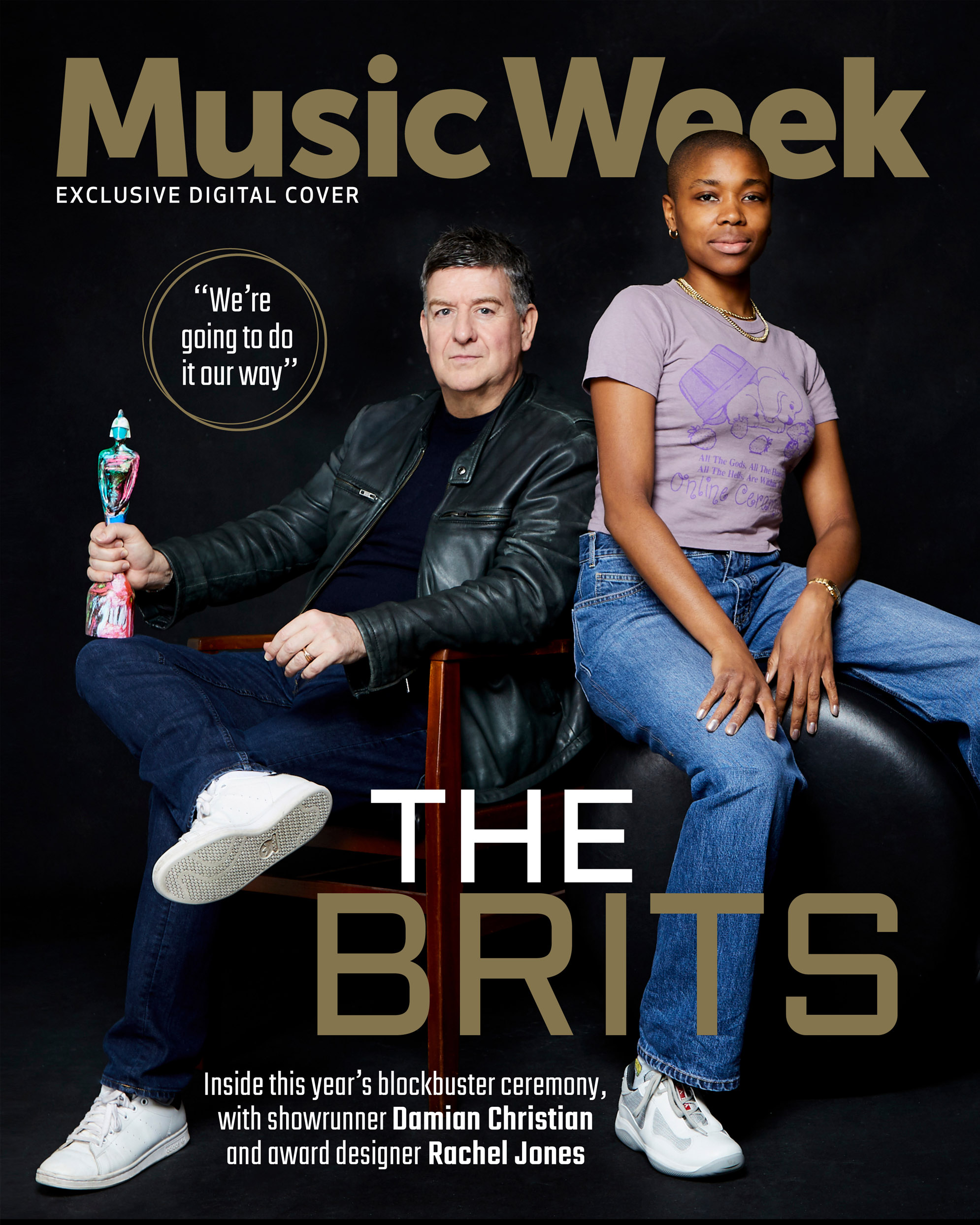
You spoke earlier about the BRITs 2023 debrief – what were the biggest lessons you took from last year?
“Extending Artist Of The Year to 10 was a big thing. We all felt disappointed with the lack of women in the category last year, it was an uncomfortable moment, and the changes we made following the review into last year's show along with wider consultation with relevant industry groups and individuals, have made a difference. At the end of this year's show, we'll do exactly the same – review everything again, including the genre awards, look at what worked and what didn't.”
Now there is a standalone R&B category, how do you reflect on the fallout from the mix of pop/R&B last year? What’s your message to the R&B community now?
“It's an enormous field for the UK and around the world, and having R&B stuck in with pop just didn't feel right. The message is that it deserves a category of its own and this year, we could actually make that happen.”
It’s one of several genre categories and the shortlists are stacked with talent across those, but are you under pressure to introduce more genre categories?
“Well listen, if you talk to the jazz specialists then they'll say, ‘Yeah, of course.’ But if you start doing too many, the show becomes too long. I think two hours 15 minutes is probably the longest you can make the awards, otherwise it's hard to keep an audience. And if you do jazz, it’s then, ‘Well, why don't you do this as well?’ It's something that we look at every year. I don't get too involved in that, I let the experts in those fields help and decide.”
Have you been under pressure to represent genres that fall between the cracks?
“As you can imagine, I get a lot of phone calls from labels, managers, agents, artists, but there are no massive rows or pressure, we just try and pick the right artists for the show.”
Representation of women on shortlists was a big talking point last year. There are now 10 nominees for Artist and International Artist. Walk us through the process of getting here…
“Making the change to extend the number of nominations from five to 10 in Artist Of The Year was a carefully considered, and widely consulted on, decision, and this has improved representation this year, which we are all very happy with. The last 12 months was a big year for UK women artists in the charts, and compared to the year before, there was a higher number of artists eligible for AOTY – we know this won't always be the case so it's important we are always looking at how we can maintain representation, and reviewing everything year on year, and putting a spotlight on this from a wider industry perspective. This review also goes for the Voting Academy – which we refresh every year – and we impress on the Academy members the responsibility and importance of making informed decisions when voting.”
So has the move to mixed gender categories worked out in the long run in terms of representation after a shaky start?
“We were, of course, very happy that women feature so heavily in the Artist Of The Year categories, British and International, this year, after the disappointment felt over this category in 2023. We work hard to achieve balance and diversity across all the categories, and while the long lists of artists eligible will differ each year depending on music trends and chart impact, we will continue to review how we can deliver nominations and a show that feels representative.”
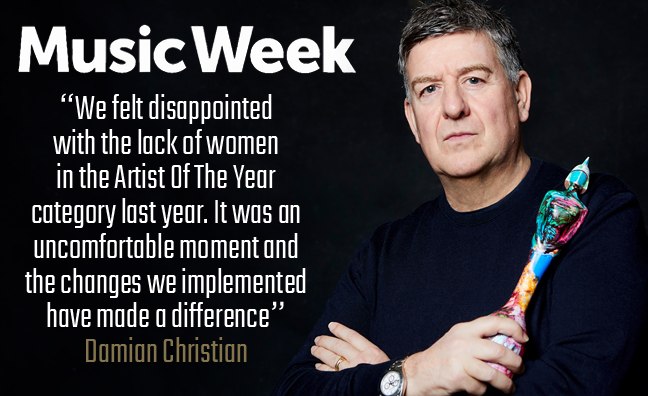
In the wake of the changes, the BPI's Dr Jo Twist and YolanDa Brown said: “We hope and will continue to work towards more balanced representation increasingly becoming the norm rather than the exception”. In your view, can this hope become reality?
“Very much so. I think what happened last year has made everybody super-aware and it can't happen like that again. We will look at it every year and measure, but it feels like there's more women coming through, especially when you look at categories such as Rising Star, Best New Artist, so it’s a natural thing. Rather than having to put things in place, I think it should even itself out naturally.”
What do this year’s lists tell us about female talent in the industry?
“That it's booming, absolutely booming, which is great news. From PinkPantheress to Olivia Dean, it’s going to be an interesting night, for sure. Obviously, Raye is a big story and her breaking the record of noms, especially from being signed, and then not signed, and then coming back again. It’s a brilliant story for her.”
Raye has a record-breaking seven nominations. Can you sum up the importance of her story and what it tells us about the UK industry?
“I feel quite strongly about this: many artists get signed and some go on to have amazing careers, but others don't quite get there and it's nobody’s fault. It’s not always the label's fault. I don't know all the ins and outs [of Raye’s label situation] and whether it was a clash or whatever, but for young, up-and-coming artists, knowing that you can have a second chance when the first chance hasn’t quite worked out must be so inspiring. And who doesn't like an underdog? This feels like the underdog story of the year for me.”
At the opposite end of their career, the Rolling Stones have received their first nod in over 10 years…
“That's just brilliant, isn't it? Who doesn't like the Rolling Stones? Let's try and get them on next year! That would be amazing. It just shows the kind of cross section you've got with these young artists and then acts like the Stones and Blur, who have been around for a long time and are still super-important.”
Central Cee also features heavily, having hit the mainstream and broken records without playing the industry game in the slightest. Why is it important that the BRITs shines a light on what he’s doing?
“I was lucky enough to work on Central Cee before he signed to Columbia, so I saw it first hand. Central Cee is a super talent and undoubtedly a superstar in the making. He doesn't do a lot of promotion; he's happy his music is speaking for itself. I think his importance is in making music, doing what he thinks is right and being successful without going through the old-fashioned route.”
J Hus has four nominations – does he have enough credit for his role in the rise in UK rap and Black music over the last six or seven years?
“If you speak to anybody in the world of rap, very much so. I speak with Mel Rudder or Austin Daboh at Atlantic and they speak so highly of him. Outside of the industry, maybe not, but he had a No.1 album and still sells in decent numbers. I wouldn't underestimate what he's done at all.”
Harry Styles swept the board last year. What are the chances of someone – Raye, for example – doing the same this year?
“There seems to be one person who normally has a good night – Adele, Ed, Stormzy [all have previously] and Harry really went for gold last year. Will one person clean up? You'll have to wait and see. But if it were to be Raye, then that wouldn't be the worst thing.”
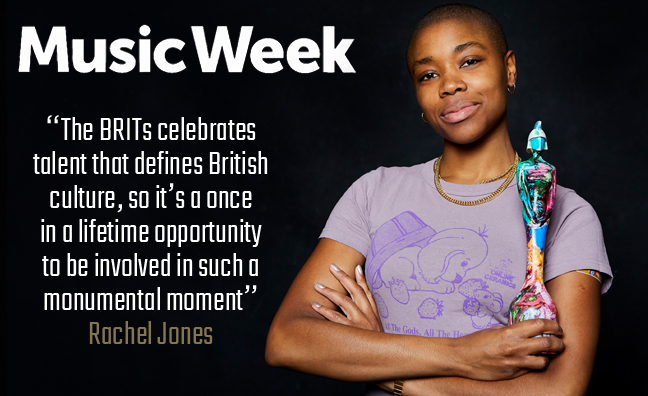
Last year was not a great 12 months for breakthrough talent – is that a concern for 2024 and beyond? How does the BRITs answer the question of breaking talent?
“Rising Star is a prestigious award that is taken very seriously. But I don't think the BRITs can do too much about breaking new artists. Putting a brand new band on that Saturday night slot, I don't think they'd get anything from that personally – you'd rather they came back as a breakthrough the following year.”
What does this year’s line-up say about British music right now?
“You've got superstars and collaborations. You've got African music, British bands, Kylie and an American superstar in there as well. If you go through it, there really is something for everybody. It's hard to get your eight moments in reflecting last year, and it also [depends] who's available. We respect ITV enormously for giving us their Saturday night, but we've got to make sure the BRIT Awards is done the right way as well. It can't all be glitzy; some of it's got to be about the music industry and the success stories of last year. One of the things we ask everybody is to do their big song. Historically, people will come in and want to do their new song, or a B-side Argentinian import, but you're thinking, ‘No, go for your big song for a Saturday night.’ And everyone has basically said, ‘Yeah, that makes sense,’ because it's a reflection of the last year.”
Unique collaborations are a hallmark of the BRITs but have been a challenge in the past…
“Unless you've actually got a song in place like Calvin and Ellie, for example, then getting artists to do that is hard going. I always think it needs to come from artist to artist. Of course, we could hit up the biggest names out there, but it doesn't tend to work. When Ed Sheeran picked Bring Me The Horizon to open [in 2022], that was his idea. A wise man said to me if you write the perfect song, you can have it as a ballad, pop song or rock song, and I reflected on that. So when Ed picked to do a rock version of Bad Habits, it worked almost better than the original. But that came from him and his little black book, so I feel it needs to come from the artists.”
What can we expect from Kylie’s moment?
“I think it's going to be brilliant. We started talking to Kylie's people in May last year and they really wanted to be on the show. I loved the enthusiasm they brought and how much she wanted to do it. We would have been tempted anyway, but she had an amazing year – Padam Padam was her biggest hit single for years and years – and when you have a big moment again, you come back into vogue to another generation of people. She’s iconic over here.”
How do you decide who gets that prestigious slot?
“We talk that through amongst the labels and with the producer. Again, who's available? Who's had a record out? How well will it be perceived in the industry? Is it deserving? And it’s one million per cent deserving with Kylie.”
Announcing Dua Lipa as the first act was a major statement. How easy was it to get her on the bill?
“Well, obviously I work within [Atlantic] as well. Dua wanted to do it. She's one of the biggest female stars in the world and you want one of your big UK acts [on the show]. Last year it was Harry and there are a few in that category like Ed and Adele and Dua. I must admit when Dua confirmed, it was a good moment and I think it is reflective that the BRITs is still super-important for artists. Her album will be massive globally; there's no doubt about that.”
We saw her open the Grammys – is there pressure for this to top that?
“We don't compare the BRITs to the Grammys or the BAFTAs too much. The BRITs is the BRITs; it's the biggest night in the UK music calendar and we're going to do it our way.”
In light of Sophie Ellis-Bextor’s recent turn at the BAFTAs, have you talked about incorporating more catalogue into performances? If not, is the BRITs missing a trick?
“To be honest, no, that hasn't really happened. It's something that could happen because catalogue is such big business for the labels, but I don't see that at the forefront of the BRITs at the moment. It was something we had looked at with Sophie Ellis-Bextor, but she was doing the BAFTAs and there were only two weeks in between. She wasn't nominated for a BRIT and a lot of people who are nominated would probably have had their noses put out if she'd have been on. But it was definitely a conversation.”
How do you make sure the show isn’t boring?
“Sometimes, you'll try and make it [shorter], but you kind of can't. Mo Gilligan did a fantastic job, but I think by having three [presenters] up there, the energy they're going to put out there in the room and on TV will be super-helpful. I've always thought it's at least a two-person job and having the three of those, mixed together with all the acts we've got, will really help.”
Where does the BRITs go from here?
“You look at it year on year and see how you can make it better and evolve it. Everyone genuinely wants to make it better and to listen and learn.”
Why do the BRITs still matter?
“Well, I think the artists answer that by turning up and wanting to perform. Everyone likes to get an award, but just being nominated is a massive deal to lots of these artists. I didn't realise that quite as much until I was doing this.”
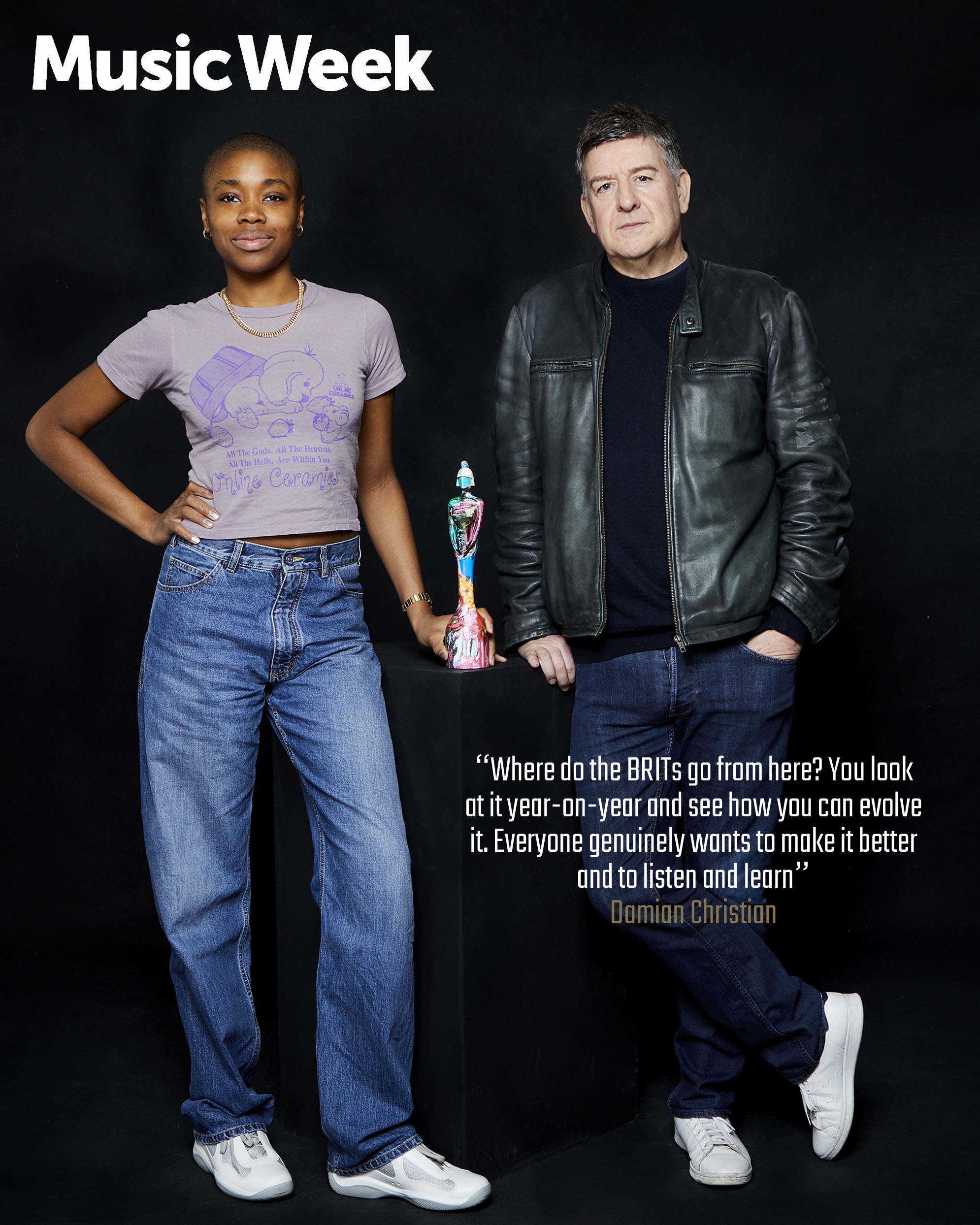
Are there any misconceptions about your tenure you’d like to set straight?
“All I've had is good feedback, funnily enough. No one said, ‘What's that arsehole doing it for?!’ It's felt genuine. People have been very respectful because they know it's not an easy job. I mean, there's always going to be somebody a little bit put out that their act's not on, and I respect and appreciate that, because I've been there. I've been on the other side of the fence for a million years trying to get my acts on.”
What part of your contribution as chair have you been most proud of so far?
“I've said it so many times, but I think getting the Saturday night [slot] – and keeping it – is definitely the key, so that's two years on the trot.”
And what’s been your biggest lesson in the job up to this point?
“When you’re putting a programme together, it can't all be, ‘Book, book, book’ – you need the right sound, the right records, the right artists, and I've learned more about that. When you're trying to get your acts on a TV show – especially a bigger show – the producer always says, ‘It’s about the flow of the show,’ and at the time you think, ‘What does that even mean?’. When you're doing it, you understand.”
To finish, do you have any advice for your successor, when the time comes to hand over the BRITs reins?
“Go into it open-eyed and enjoy it. Don't read every single bit of press and listen to people you respect and love. Be your own person and be confident with it as well – stand in front of it.”
